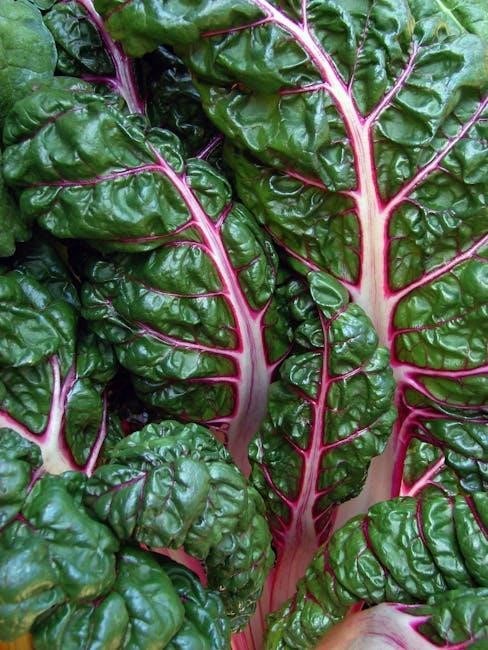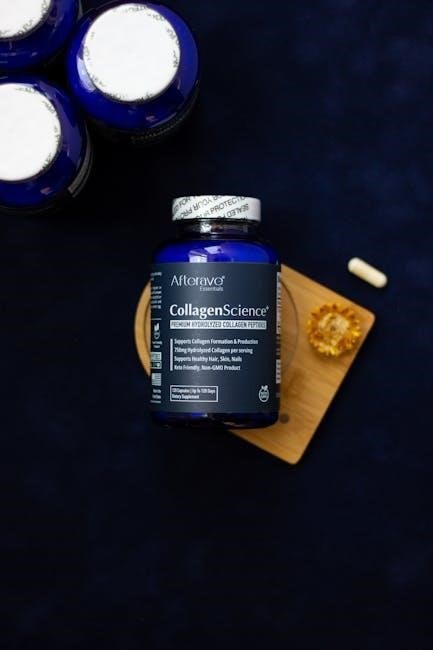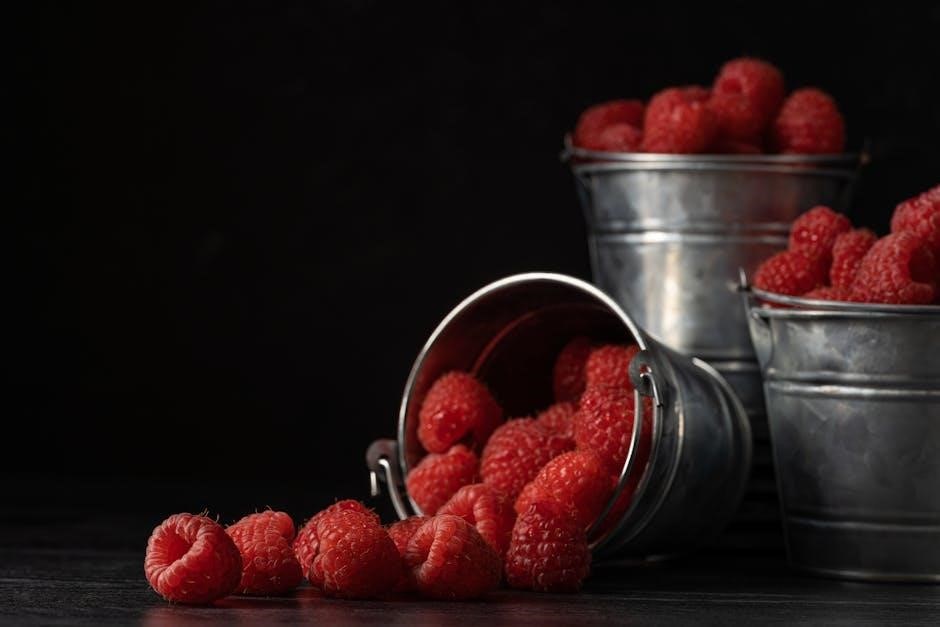The Anti-Anxiety Diet is a dietary approach designed to reduce anxiety symptoms by focusing on nutrient-rich‚ anti-inflammatory foods. It emphasizes whole foods‚ omega-3s‚ and gut health to support mental well-being.
1.1 What is the Anti-Anxiety Diet?
The Anti-Anxiety Diet is a tailored dietary plan aimed at reducing symptoms of anxiety by promoting a balanced intake of nutrient-dense foods. It focuses on whole‚ unprocessed foods such as fruits‚ vegetables‚ lean proteins‚ and whole grains‚ while minimizing sugary‚ high-sodium‚ and inflammatory foods. This diet emphasizes the importance of omega-3 fatty acids‚ fiber‚ and probiotics‚ which support brain health and gut function. By addressing inflammation and nutritional deficiencies‚ the Anti-Anxiety Diet helps stabilize mood and reduce anxiety. It is not a quick fix but a sustainable lifestyle change that complements other anxiety management strategies‚ such as therapy and exercise‚ to improve overall mental well-being.
1.2 The Connection Between Diet and Anxiety
Research shows a strong link between diet and anxiety‚ with certain foods exacerbating symptoms while others alleviate them. A diet high in processed‚ sugary‚ and inflammatory foods can increase anxiety by promoting inflammation and disrupting gut health. The gut-brain axis plays a crucial role‚ as an unhealthy gut microbiome can impair mental health. Conversely‚ anti-inflammatory foods like fatty fish‚ whole grains‚ and vegetables support brain function and reduce anxiety. Hydration and nutrient balance are also vital‚ as deficiencies in vitamins and minerals can worsen anxiety. Understanding this connection highlights the importance of a balanced diet in managing anxiety and improving overall mental well-being.
1.3 Benefits of an Anti-Anxiety Diet
Adopting an anti-anxiety diet offers numerous benefits‚ including reduced inflammation‚ improved mood stability‚ and enhanced mental clarity. By focusing on nutrient-dense foods‚ individuals can experience a significant decrease in anxiety symptoms. The diet helps stabilize blood sugar levels‚ preventing energy crashes that may contribute to anxiety; Additionally‚ it supports gut health‚ which is closely linked to brain function and emotional well-being. Omega-3 fatty acids and antioxidants found in anti-anxiety foods also promote neurotransmitter balance‚ further alleviating anxiety. Overall‚ this dietary approach provides a holistic way to manage anxiety while improving overall health and vitality.

Key Components of the Anti-Anxiety Diet
The anti-anxiety diet focuses on reducing inflammation‚ incorporating omega-3 fatty acids‚ and emphasizing whole grains and fiber to promote mental health and emotional well-being.
2.1 Foods That Reduce Inflammation
Foods that reduce inflammation are central to the anti-anxiety diet. These include fatty fish like salmon‚ which are rich in omega-3 fatty acids‚ leafy greens such as spinach‚ and berries like blueberries‚ all packed with antioxidants. Nuts‚ seeds‚ and turmeric also play a key role due to their anti-inflammatory properties. These foods help lower chronic inflammation‚ which is linked to anxiety. By incorporating them into your diet‚ you can reduce inflammation and promote a calmer mind. A diet rich in these foods supports overall mental health and can alleviate anxiety symptoms effectively.
2.2 The Role of Omega-3 Fatty Acids
Omega-3 fatty acids play a crucial role in the anti-anxiety diet by supporting brain health and reducing anxiety symptoms. Found in fatty fish like salmon‚ mackerel‚ and sardines‚ as well as in flaxseeds and walnuts‚ these fats are essential for brain function. They help reduce brain inflammation‚ promote neurotransmitter balance‚ and improve mood regulation. Studies suggest that higher intake of omega-3s is associated with lower levels of anxiety. Incorporating these foods into your diet can enhance emotional resilience and contribute to a calmer‚ more stable mental state‚ making them a key component of an anti-anxiety lifestyle.
2.3 Importance of Whole Grains and Fiber

Whole grains and fiber are essential for maintaining mental health and reducing anxiety. They help stabilize blood sugar levels‚ preventing drastic mood swings and energy crashes. Foods like oats‚ quinoa‚ and brown rice are rich in complex carbohydrates‚ which promote serotonin production‚ a neurotransmitter linked to calmness. Fiber also supports gut health by fostering a balanced microbiome‚ crucial for the gut-brain connection. A diet high in whole grains and fiber can enhance emotional resilience‚ reduce inflammation‚ and improve overall brain function. Incorporating these foods into meals helps create a steady supply of nutrients‚ supporting long-term mental well-being and anxiety management.

Foods to Avoid for Managing Anxiety
Sugary‚ processed foods‚ and those high in sodium and preservatives can trigger anxiety. Caffeine and alcohol may worsen symptoms‚ while inflammatory foods exacerbate mental distress. Avoid these to reduce anxiety.
3.1 Sugary and Processed Foods

Sugary and processed foods can significantly contribute to anxiety by causing rapid blood sugar spikes and crashes‚ leading to energy fluctuations and mood instability. These foods often lack essential nutrients and instead contain artificial additives and preservatives that can worsen anxiety symptoms. Regular consumption of such foods can lead to inflammation‚ impairing brain function and mental health. Additionally‚ they can disrupt gut health‚ which is closely linked to anxiety. To manage anxiety effectively‚ it’s crucial to limit or eliminate sugary snacks‚ refined carbohydrates‚ and processed meals from your diet. Opting for whole‚ nutrient-dense foods instead can help stabilize your mood and reduce anxiety triggers.
3.2 Caffeine and Alcohol
Caffeine and alcohol are substances that can negatively impact anxiety levels. Caffeine‚ while a common stimulant‚ can increase heart rate and jitteriness‚ mimicking anxiety symptoms and worsening feelings of unease. Alcohol‚ though often used as a coping mechanism‚ disrupts serotonin levels and can lead to heightened anxiety after its effects wear off. Both substances interfere with sleep quality‚ which is crucial for mental health. Reducing or eliminating caffeine and alcohol consumption can help stabilize mood and reduce anxiety triggers. It’s important to replace these with hydrating beverages like water and herbal teas to support overall well-being and maintain a balanced mental state.
3.3 Foods High in Sodium and Preservatives
Foods high in sodium and preservatives can exacerbate anxiety symptoms by increasing blood pressure and promoting inflammation. Processed foods‚ such as canned goods‚ frozen meals‚ and snacks‚ often contain excessive sodium and artificial additives that can disrupt bodily functions. High sodium intake can lead to fluid imbalance and bloating‚ while preservatives may trigger inflammation in the gut‚ which is closely linked to mental health. Limiting these foods helps reduce physical discomfort and supports a calmer nervous system. Opting for fresh‚ whole foods and reading food labels to avoid hidden sodium and preservatives are key steps in managing anxiety through diet.
The Gut-Brain Axis and Anxiety
The gut-brain axis is a bidirectional communication network linking the digestive system and central nervous system‚ influencing mental health. An imbalance in gut bacteria can contribute to anxiety.
4.1 How the Gut Affects Mental Health
The gut and brain are interconnected through the gut-brain axis‚ a communication network involving the nervous system‚ hormones‚ and microbiota. A healthy gut microbiome produces neurotransmitters like serotonin and dopamine‚ which regulate mood. An imbalanced gut microbiome‚ or dysbiosis‚ can lead to inflammation and impaired neurotransmitter production‚ exacerbating anxiety. Additionally‚ the gut lining plays a crucial role in nutrient absorption‚ which affects brain function. A diet rich in probiotics and prebiotics supports gut health‚ while processed foods and high sugar intake can disrupt it‚ further linking gut health to mental well-being.
4.2 Probiotic-Rich Foods for Gut Health
Probiotic-rich foods are essential for maintaining a healthy gut microbiome‚ which directly impacts mental health. Fermented foods like yogurt‚ kefir‚ sauerkraut‚ kimchi‚ and kombucha contain live cultures that promote beneficial gut bacteria. These foods enhance digestion‚ reduce inflammation‚ and support the production of neurotransmitters like serotonin and dopamine‚ which regulate mood. Incorporating these into your diet can improve gut integrity and reduce anxiety symptoms. Additionally‚ foods high in prebiotics‚ such as bananas‚ onions‚ and garlic‚ feed probiotics‚ fostering a balanced gut environment. A diverse gut microbiome is crucial for optimal mental well-being‚ making probiotic-rich foods a cornerstone of the anti-anxiety diet.

Lifestyle Factors That Enhance the Anti-Anxiety Diet
Lifestyle factors like hydration‚ regular physical activity‚ and quality sleep enhance the anti-anxiety diet’s effectiveness‚ addressing both physical and mental health to reduce anxiety symptoms naturally.
5.1 Hydration and Its Impact on Anxiety

Hydration plays a crucial role in managing anxiety‚ as even mild dehydration can impair brain function and mood. Water is essential for maintaining neurotransmitter balance‚ which regulates emotional responses. Dehydration can lead to increased heart rate‚ dizziness‚ and fatigue‚ exacerbating anxiety symptoms. Drinking enough water helps maintain focus and calmness‚ while insufficient hydration can heighten stress sensitivity. Incorporating water-rich foods‚ like fruits and vegetables‚ alongside regular water intake‚ supports overall brain health. Limiting caffeine and alcohol‚ which dehydrate the body‚ is also recommended to avoid worsening anxiety. Staying hydrated is a simple yet effective strategy to enhance mental well-being and reduce anxiety naturally.

5.2 Exercise and Physical Activity
Regular exercise is a powerful tool for managing anxiety‚ as it reduces stress hormones and boosts mood-enhancing endorphins. Physical activity promotes relaxation and improves sleep quality‚ both of which are critical for anxiety relief. Even moderate exercise‚ such as daily walks or yoga‚ can significantly lower anxiety levels; Activities like tai chi and swimming combine physical movement with mindfulness‚ further enhancing their anti-anxiety effects. Consistency is key‚ as regular exercise helps maintain emotional resilience. Incorporating exercise into your routine‚ alongside a balanced diet‚ strengthens the body’s ability to cope with anxiety and promotes long-term mental well-being.
5.3 Sleep Quality and Duration
Adequate sleep is essential for managing anxiety‚ as it regulates emotions and restores mental health. Poor sleep quality can exacerbate anxiety symptoms‚ creating a vicious cycle. Aim for 7-9 hours of uninterrupted sleep nightly to support emotional stability. Establish a bedtime routine‚ such as reading or meditation‚ to signal your body it’s time to rest. Avoid screens and caffeine before bed‚ as they can disrupt sleep patterns. A dark‚ quiet environment and a consistent sleep schedule further enhance sleep quality. Prioritizing sleep‚ alongside diet and exercise‚ helps maintain emotional balance and reduces anxiety levels effectively; Better sleep habits lead to improved mental resilience and overall well-being.

The Anti-Anxiety Diet offers a holistic approach to managing anxiety by focusing on nutrient-rich foods‚ gut health‚ and lifestyle factors like sleep and hydration‚ promoting mental well-being.
6.1 Summary of the Anti-Anxiety Diet
The Anti-Anxiety Diet focuses on reducing anxiety through dietary changes‚ emphasizing whole‚ nutrient-dense foods like fruits‚ vegetables‚ whole grains‚ and omega-3-rich foods. It avoids processed sugars‚ caffeine‚ and alcohol‚ which can trigger anxiety. The diet also highlights the importance of gut health‚ suggesting probiotic-rich foods to support the gut-brain axis. Hydration and balanced nutrition are key to maintaining mental well-being. By incorporating these elements and avoiding inflammatory foods‚ the Anti-Anxiety Diet aims to alleviate symptoms and promote long-term mental health. It is a holistic approach that combines dietary adjustments with lifestyle factors to create a comprehensive plan for managing anxiety effectively.
6.2 Final Tips for Implementing the Diet
Successfully implementing the Anti-Anxiety Diet requires commitment and mindful eating. Start by incorporating anti-inflammatory foods like fatty fish‚ whole grains‚ and colorful vegetables into your meals. Stay hydrated and limit caffeine and alcohol to avoid triggering anxiety. Regular physical activity‚ such as walking or yoga‚ complements the diet by reducing stress. Prioritize sleep quality‚ as poor sleep can exacerbate anxiety. Practice mindfulness during meals to enhance digestion and satisfaction. Keep a food diary to track how specific foods affect your mood and energy levels; Gradually transition to the diet to avoid overwhelm and seek professional guidance if needed. Consistency and patience are key to experiencing long-term benefits.